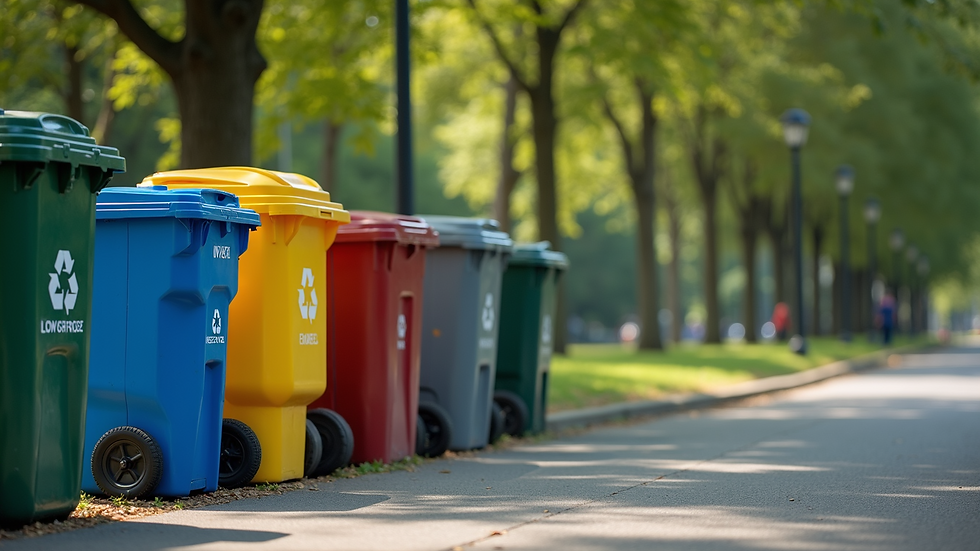Responsible Waste Management for Sustainable Practices
- Writer
- Aug 26, 2025
- 3 min read
Waste management is a critical issue facing communities worldwide. As populations grow and consumption increases, the amount of waste generated continues to rise. Without proper handling, waste can lead to environmental pollution, health hazards, and resource depletion. To address these challenges, adopting sustainable waste strategies is essential. These strategies not only reduce the negative impact of waste but also promote resource efficiency and environmental stewardship.
Understanding Sustainable Waste Strategies
Sustainable waste strategies focus on minimizing waste generation and maximizing resource recovery. The goal is to create a circular system where materials are reused, recycled, or composted rather than discarded in landfills or incinerators. This approach helps conserve natural resources, reduce greenhouse gas emissions, and protect ecosystems.
Some common sustainable waste strategies include:
Reduce: Limiting the amount of waste produced by choosing products with less packaging or buying in bulk.
Reuse: Finding new uses for items instead of throwing them away, such as repurposing containers or donating old clothes.
Recycle: Processing materials like paper, plastic, glass, and metal to make new products.
Compost: Turning organic waste like food scraps and yard trimmings into nutrient-rich soil amendments.
Implementing these strategies requires cooperation from individuals, businesses, and governments. Education and awareness campaigns can encourage responsible consumption and waste disposal habits.

Recycling bins arranged in a public park encourage community participation in waste segregation.
What is the meaning of responsible waste management?
Responsible waste management refers to the careful and ethical handling of waste to minimize its impact on the environment and society. It involves the entire lifecycle of waste - from generation to disposal - ensuring that waste is managed in a way that protects human health and conserves natural resources.
This concept includes:
Proper segregation of waste at the source to facilitate recycling and composting.
Safe collection and transportation to prevent littering and contamination.
Environmentally sound treatment and disposal methods.
Compliance with regulations and standards to avoid illegal dumping or hazardous waste mishandling.
By practicing responsible waste management, communities can reduce pollution, conserve energy, and create economic opportunities through recycling industries. For example, many cities have introduced waste-to-energy plants that convert non-recyclable waste into electricity, reducing landfill use.

Organic waste decomposing in a compost heap helps reduce landfill burden and enrich soil.
Practical Steps to Implement Sustainable Waste Strategies
Adopting sustainable waste strategies can seem overwhelming, but small, consistent actions make a big difference. Here are practical steps individuals and organizations can take:
Conduct a Waste Audit
Identify the types and quantities of waste generated. This helps target reduction efforts effectively.
Set Clear Waste Reduction Goals
Establish measurable targets such as reducing plastic use by 50% within a year.
Promote Waste Segregation
Use separate bins for recyclables, compostables, and landfill waste. Label bins clearly to avoid contamination.
Encourage Reuse and Repair
Organize swap events, repair workshops, or donation drives to extend the life of products.
Partner with Recycling Facilities
Collaborate with certified recyclers to ensure materials are processed responsibly.
Educate and Engage Stakeholders
Provide training and awareness programs for employees, customers, or community members.
Monitor and Report Progress
Track waste reduction achievements and share results to motivate continued efforts.
Businesses can also adopt sustainable packaging, optimize supply chains to reduce waste, and invest in circular economy initiatives. Governments play a crucial role by enforcing regulations, providing infrastructure, and incentivizing sustainable practices.

Community clean-up event collecting plastic waste to promote environmental responsibility.
The Role of Technology in Sustainable Waste Management
Technology is transforming how waste is managed, making processes more efficient and transparent. Innovations include:
Smart Waste Bins: Equipped with sensors to monitor fill levels and optimize collection routes, reducing fuel consumption.
Automated Sorting Systems: Use AI and robotics to separate recyclables accurately, improving material recovery rates.
Waste-to-Energy Technologies: Convert non-recyclable waste into electricity or fuel, reducing landfill dependency.
Mobile Apps: Help users locate recycling centers, schedule pickups, or learn about waste reduction tips.
These technologies support sustainable waste strategies by lowering operational costs, minimizing environmental impact, and enhancing user engagement. However, technology should complement, not replace, community participation and responsible behavior.
Moving Forward with Responsible Waste Management
Adopting sustainable waste strategies is a shared responsibility that requires commitment from all sectors of society. By integrating these practices into daily life and business operations, we can reduce environmental harm and conserve resources for future generations.
For those interested in learning more about responsible waste management, numerous resources and organizations offer guidance and support. Taking action today helps build a cleaner, healthier, and more sustainable world.
Together, through informed choices and collective effort, sustainable waste management can become a reality that benefits people and the planet alike.
.png)



Comments